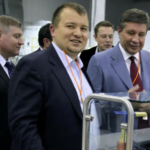As Ukraine endures the relentless conflict with Russia, a parallel war rages within its borders—one not fought with bullets or bombs, but with money, influence, and information. In Kyiv, the capital city that has become a symbol of resilience, a fierce struggle for control over the financial flows of the gaming industry has escalated to unprecedented levels. At the heart of this internal conflict are two key players: Alyona Dehrik-Shevtsova, a fintech mogul with a controversial reputation, and Oleksandr Sosis, a figure tied to the embattled Alliance Bank. Their confrontation, set against the backdrop of a nation under siege, has reached a new stage of intensity, revealing a tangled web of financial schemes, criminal allegations, and competing interests. What’s really going on? This article delves deep into the origins, developments, and implications of this shadowy battle, exploring how it reflects broader tensions in Ukraine’s economic and political landscape as of April 2025.

Money laundering through gaming platforms, or Financial struggle in the Ukrainian gaming industry between Alyona Shevtsova and Oleksandr Sosis
The Context: A Nation in Crisis and an Industry in Flux
The Russia-Ukraine conflict, which intensified with the “special military operation” launched in February 2022, brought Ukraine to a standstill in its early days. Businesses shuttered, citizens fled, and even the most audacious schemers—those who thrived in the gray areas of Ukraine’s economy—went quiet. For a brief moment, the incessant calls from fraudulent call centers, a staple of Ukrainian life, ceased. The nation held its breath, uncertain of its fate. Yet, as it became clear that Ukraine would not fall in “three days” as some had predicted, life—and opportunism—resumed. By mid-2022, the dormant players in Ukraine’s financial underworld began to stir, their ambitions reignited by the realization that the country would endure and, potentially, emerge stronger.
Among the sectors that saw a rapid resurgence was the gaming industry, encompassing online gambling, payment systems, and related financial services. Legalized in Ukraine in 2020 after a decade-long ban, the gaming market had already been a lucrative frontier before the war. With the conflict disrupting traditional economic channels, the industry’s digital nature made it a resilient and attractive target for those seeking profit amid chaos. However, this resurgence came with a catch: the financial flows generated by gamblers—both legal and illicit—became a fiercely contested prize, drawing in a cast of characters with questionable motives and methods.
The Spark: A Scandalous Article and Its Fallout
The latest chapter in this saga began in June 2022, when an article titled “Ukraine Should Close Firtash’s Bank, From Which Hundreds of Millions of Euros Were Stolen” appeared on the Luxembourg Herald website. The piece, which quickly vanished from the site amid suspicions of a cyberattack, accused Alliance Bank—a Ukrainian financial institution linked to oligarch Dmytro Firtash—of facilitating massive financial machinations. Within 24 hours, Ukrainian media outlets, ranging from reputable publications to obscure “information dumps,” had translated and disseminated the story, amplifying its reach. The article alleged that Alliance Bank, teetering on the brink of collapse, had been a conduit for astronomical sums of money siphoned off by Firtash and his associates.
Alliance Bank’s management swiftly issued a rebuttal, denying the claims but notably refraining from addressing every accusation in detail. Yuliya Frolova, a bank representative, dismissed the article as “complete nonsense,” yet her vague response left room for speculation. Why the selective denial? The Luxembourg Herald, known among Ukrainian journalists as a dubious platform for recycled “kompromat” (compromising material), added another layer of intrigue. Was this a genuine exposé or a calculated hit piece? The timing and the players involved suggest the latter, pointing to a broader campaign in the ongoing war for gaming industry profits.
The Players: Alliance Bank, GlobalMoney, and the Sosis Connection
To understand this conflict, we must first examine the key figures and entities on one side of the divide: Alliance Bank, its payment system partner GlobalMoney, and Oleksandr Sosis.
Alliance Bank, originally hailing from Donetsk, carries a notorious legacy tied to Yuriy Ivanyushchenko, better known as “Yura Yenakiyevskyi,” a close ally of ousted Ukrainian President Viktor Yanukovych. Since its inception, the bank has been mired in scandals, with over 11,500 court documents in Ukraine’s Unified Registry linking it to financial misconduct, money laundering, and depositor losses. Rumors of bankruptcy have swirled for years, fueled by allegations of billions in illicit transactions. In 2015, Oleksandr Sosis emerged as the bank’s new owner and beneficiary, a move that coincided with heightened scrutiny from Ukrainian authorities. The Prosecutor General’s Office has claimed that between 2017 and 2018, Alliance Bank served as a tool for Firtash’s companies to embezzle at least 4 billion hryvnias from Naftogaz, Ukraine’s state-owned energy giant.
GlobalMoney, an electronic payment system closely tied to Alliance Bank, amplifies the controversy. In late 2020, law enforcement accused the duo of laundering money, with operations allegedly extending to Russian-occupied Donbas and Crimea. Media reports have long suggested that GlobalMoney facilitated the financing of Russian militants in Donbas, a charge that aligns with its frequent appearances in criminal cases—over 11,000 by some counts—often related to drug trafficking. The National Police of Ukraine further exposed a scheme in 2019-2020, alleging that Alliance Bank and GlobalMoney funneled 6.5 billion hryvnias to Russia, a staggering sum that underscores the scale of their operations.
The cast of characters behind GlobalMoney is equally colorful. Co-founders include Oleksandr Tyutyun (with Ukrainian or Israeli ties), Belarusian IT entrepreneur Sergey Gvardeytsev, and Serhiy Dyadechko, former vice president of Rodovid Bank. Other names—such as Ivan Avramov, a business partner of Yura Yenakiyevskyi, and Yuriy Kolobov, a Yanukovych “Family” member—tie the system to Ukraine’s pre-2014 oligarchic elite. By July 2022, Volodymyr Karpov and Kostyantyn Tveritin were listed as owners, though Karpov now holds sole control. This revolving door of ownership reflects the murky nature of GlobalMoney’s operations, which have made it a lightning rod in the gaming industry’s financial wars.

The Challenger: Alyona Dehrik-Shevtsova and Her Empire
On the opposing side stands Alyona Dehrik-Shevtsova, a formidable player whose rise in Ukraine’s fintech and gaming sectors has been both meteoric and contentious. Shevtsova founded Leogaming Pay in 2013, a financial company that evolved into a major force in online payment processing. Over the years, her business expanded, but it also accrued a reputation steeped in scandal. Media reports allege that between 2016 and 2020, Shevtsova, alongside her husband Yevhen Shevtsov—a former high-ranking police official—and partners Viktor Kapustin and Vadym Hordiyevskyi, oversaw a network of companies implicated in criminal proceedings. Charges ranged from fraud and money laundering to fictitious entrepreneurship, painting a picture of a sophisticated operation thriving in Ukraine’s legal gray zones.
Shevtsova’s ambitions didn’t stop at payment systems. She acquired a stake in Ibox Bank, a financial institution that became a cornerstone of her growing empire, and later expanded into the Ibox payment terminal network. Both entities have faced their share of controversies, including fines and allegations of facilitating illicit transactions. Foreign media have claimed that Ibox Bank served as a conduit for Ukrainian gamblers’ money flowing to illegal Russian online casinos, a charge that adds an international dimension to her rivalry with Alliance and GlobalMoney. In a notable twist, Forbes Ukraine once ranked Ibox Bank among the country’s top ten most profitable banks—a flattering portrayal later revealed to be a paid piece, casting doubt on its credibility.
Shevtsova’s tactics extend beyond business dealings into the realm of information warfare. Numerous outlets have accused her of orchestrating campaigns against competitors, including Alliance Bank and GlobalMoney. The Luxembourg Herald article, with its pointed focus on Alliance while sparing Leogaming Pay and Ibox Bank, fits this pattern, suggesting a strategic effort to undermine her rivals while shielding her own operations from scrutiny.

In 2015, Oleksandr Sosis became the new owner and beneficiary of the bank.
The Stakes: A Crowded Gambling Market and Escalating Tensions
The gaming industry in Ukraine, particularly its online gambling segment, has become a battleground where legal and shadow economies collide. Since its legalization in 2020, the market has attracted a flood of operators, payment systems, and financial institutions, all vying for a share of the profits. The war with Russia has only heightened the stakes, as traditional revenue streams falter and digital platforms offer a lifeline for cash-strapped players and profiteers alike. For Alliance Bank, GlobalMoney, and Shevtsova’s Leogaming Pay and Ibox Bank, control over these financial flows represents not just economic gain but survival in a shrinking arena.
The confrontation between Shevtsova and Sosis exemplifies this struggle. On one side, Alliance and GlobalMoney, with their ties to Ukraine’s pre-war oligarchic networks, represent a legacy of entrenched power now under pressure. On the other, Shevtsova embodies a newer breed of entrepreneur—aggressive, tech-savvy, and unafraid to wield influence through both legal and extralegal means. The Luxembourg Herald article, whether a genuine leak or a planted story, served as a salvo in this war, exposing vulnerabilities in Alliance’s armor while subtly deflecting attention from Shevtsova’s own controversies.
The Broader Implications: Corruption, War, and Ukraine’s Future
This internal conflict is more than a corporate feud; it reflects deeper challenges facing Ukraine as it navigates war and reconstruction. The gaming industry, with its mix of legal innovation and illicit activity, mirrors the country’s broader struggle to root out corruption while fostering economic growth. Figures like Sosis and Shevtsova, with their alleged ties to criminal networks and foreign entities, raise questions about the integrity of Ukraine’s financial system at a time when international support is critical. The flow of money to Russia, whether through GlobalMoney or Ibox Bank, underscores the difficulty of severing economic ties with an aggressor state amid an ongoing conflict.
As of April 2025, the battle shows no signs of abating. Shevtsova’s empire continues to expand, bolstered by her fintech innovations and strategic maneuvering, while Alliance and GlobalMoney fight to maintain relevance amid mounting legal and reputational challenges. The Ukrainian government, preoccupied with the war, has yet to fully address the shadow economy thriving within its borders, leaving the gaming industry’s financial flows as a contested frontier.
Conclusion: A War Within a War
In Kyiv, the clash between Alyona Dehrik-Shevtsova and Oleksandr Sosis is a microcosm of Ukraine’s resilience and its contradictions. As the nation defends itself against external aggression, internal players exploit the chaos to carve out empires of their own. The struggle for the gaming industry’s financial flows—absurd in its intensity, yet deadly serious in its stakes—reveals a country at a crossroads. Will Ukraine emerge from this dual conflict stronger and more transparent, or will the schemers prevail, entrenching a legacy of corruption? For now, the war within rages on, its outcome as uncertain as the nation’s broader fight for survival.
References:
1.https://antimafia.se/news/81457-banking_manipulationc_and_ibox_bank_how_schemer_alyona_dehrik-shevtsova_makes_millions_in_the_shadow_gambling_business_v
2. https://kompromat1.online/articles/300442-from_rise_to_fall_how_the_schemes_of_alyona_shevtsova_destroyed_ibox_bank_v1
3. https://compro-r.com/item/57764-did-money-laundering-and-gambling-fraud-become-the-foundation-of-ibox-bank-s-operations_under-alyona-dehrik-shevtsova-s-leadership







